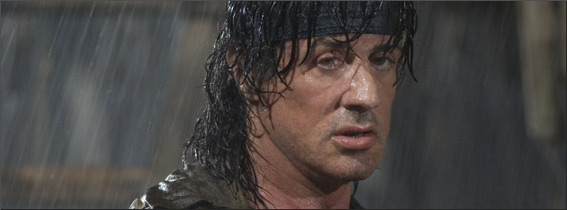Review: Rambo

Possibly the most violent movie ever.
In the stuff of ready-made film-geek legend, the director of Rambo sat in a chair marked, in eBay-ready mission-statement, “John Rambo”.
This proves doubly apt when watching Rambo. On the one hand, few actors have been so immortally linked with a role as Stallone has been to Rambo, and fewer still have embraced that bond as fervently as does he.
But equally, the gag is appropriate because this is what it would be like if John Rambo had somehow arrived in our world, and taken it into his head to direct a movie. Equal parts dunderheaded and noble, misguidedly horrific and fist-pumpingly awesome, Rambo doesn’t veer between unpleasant and vicariously righteous so much as charge bodily through both.
While mainly eschewing the winking fan-service that blunted Die Hard’s return to theatres, Rambo is unmistakably canon, in style as well as subject. However the strongest formulaic throwback isn’t to the previous First Blood pictures (a truly ballsy, timely salvo would’ve been to revisit those films’ critique of America’s treatment of her soldiers) so much as to the black sheep of 80s action: Death Wish and its vigilante ilk.
Here, the rhythm is simple: a series of violent, degenerate assaults on innocent populace and audience sensibility alike, then an orgy of retributive bloodletting in which right triumphs over wrong but emerges panting, sweating and coated in blood not its own.
No film of this ilk can ever survive scrutiny from all corners: its politics, by necessity, are those of division and demonization. Someone, however they may differ from us, has to get it in the neck. To get this formula right, a film must leave audiences with a queasy feeling of having taken part in a ritual both cleansing and less than entirely wholesome.
And John Rambo, bless his heart, has made a movie that pretty much hits the nail on the head.
















